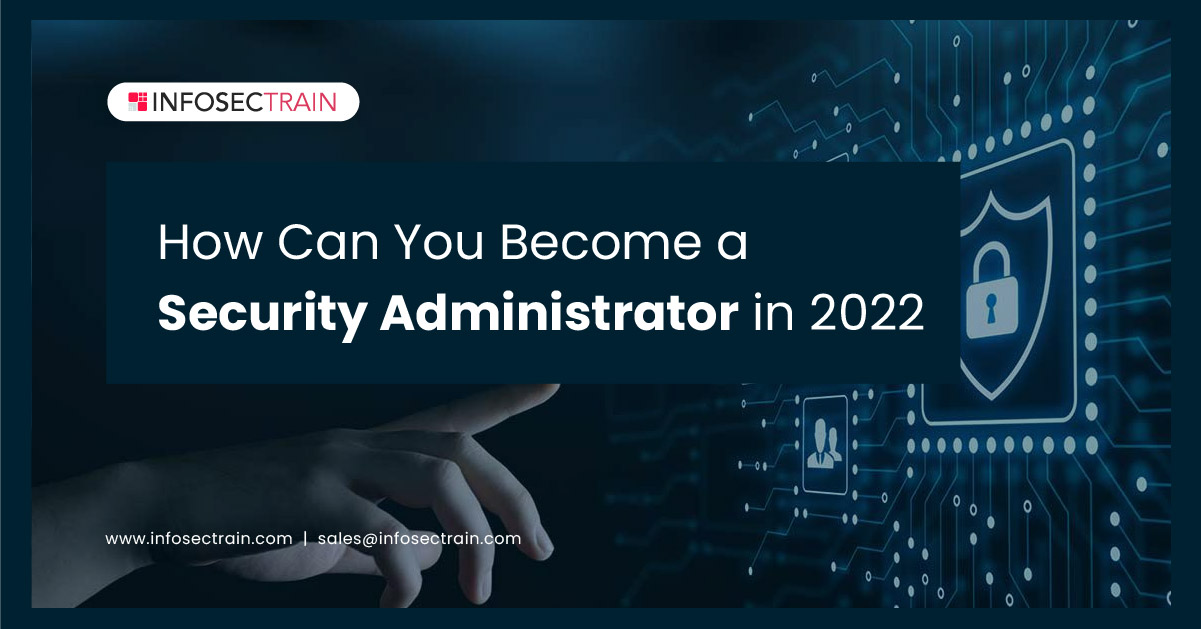How Can You Become a Security Administrator in 2022
In today’s world, every organization is adopting the latest technology, and having a solid IT infrastructure security system is more important than ever. This is why organizations need a Security Administrator, and it is also known as a Systems Security Administrator, Network Systems Administrator, or IT Security Administrator. The role and scope of the Security Administrator will vary depending on the size and type of the organization, but this is where the majority of professionals start in their cybersecurity careers.

Table of Contents
What is a Security Administrator?
What Exactly Security Administrators do?
How to Become a Security Administrator?
Job Prospect of a Security Administrator?
What is a Security Administrator?
There is always that one extraordinarily knowledgeable human who seems to know everything about computers in any organization that uses computers. He is a qualified specialist that maintains computers and network security and is the go-to person for any queries about system security. This critical individual manages all system security tools such as devices, anti-virus software, firewalls, and other configured applications running on the network.
In a cybersecurity team, a Security Administrator is usually in charge of establishing, managing, and troubleshooting security systems for an organization. They also create security policies and procedures training manuals for their teammates. Security Administrators are in charge of the entire system rather than specific components. Though Network and Systems Administrators set up and manage the system, Security Administrators step up to assess security in the broader sense. Rather than focusing on hardware and software as their equivalents do, they aim to protect the entire system from vulnerabilities.
What Exactly Security Administrators do?
Here are some of the essential roles and responsibilities of a Security Administrator:
- Performing security checks: Security Administrators conduct a system security audit regularly. They ensure that all network connections are fully functional and free of faults and conduct penetration tests to identify and mitigate any potential dangers to the system.
- Configuration of security parameters and devices: The Security Administrator is the person who knows how to keep the system secure and functions smoothly; thus, they’re the one who configures the network’s security parameters and devices, as well as performs regular updates.
- Developing security policies: The Security Administrator is well-versed in security; they are the key to creating the appropriate procedures to provide credible security. They educate employees on using the installed systems and spot potential threats and vulnerabilities.
How to Become a Security Administrator?
You can achieve a rewarding career as a Security Administrator by taking the following steps:
1. Know the Skills of Security Administrators: Following are the most common skills for Security administrators that most employers look for:
- Leadership and communication skills: While being able to manage a successful IT team is critical, there will be other areas of leadership and communication to consider. The Security Administrator will frequently need to collaborate with other organizations, most notably application development and business units that rely on IT teams for success and development. As a result, excellent communication and the ability to transform technical knowledge into ideas that a business can comprehend are essential.
- Technical expertise: A Security Administrator must have a solid understanding of security aspects connected to networking and Internet use. Authentication, access control, firewalls, disaster prevention and recovery, intrusion detection, encryption, and data integrity are all part of this. Other technical expertise includes incident response management and virus protection.
- Regulatory role: The Security Administrator should have experience in areas linked to compliance, which means that they should be able to put in place the appropriate procedures to meet audits and support associated projects. Administrators must stay on top of emerging requirements to change data security strategies accordingly, ensuring that a firm can achieve compliance.
2. Obtain the Necessary Educational Level: Security Administrator education requirements vary depending on the organization, job position, and job description. Many entry-level Security Administrator positions require a bachelor’s degree in a field linked to information technology. For advanced employment in information security, master’s degrees, such as an MBA or a master’s degree in information systems, are typically required.
3. Gain the Experience in Related Field: In any field, putting a foot in the door can be as much about the practical experience as it is about one’s knowledge. A computer science undergraduate degree can be compensated by hands-on experience in information technology contexts.
4. Choose the Right Certification for Your Career Path: Professional qualifications are not often a requirement for gaining job offers for Security Administrators because most applicants are new to the field. Any certifications that an applicant may flaunt, however, are beneficial. Popular certifications for Security Administrators include CompTIA Security+, Microsoft 365 Security Administrator, CISSP, and so on.
- CompTIA Security+: The CompTIA security+ (SY0-601) certification focuses on the fundamentals of performing IT security functions, and it concentrates on the practical abilities needed to solve a wide range of problems and concerns in IT systems. The certification covers the most recent developments and industry trends in risk management and mitigation, responding to and mitigating risks, and numerous auditing and penetration testing abilities.
- Microsoft 365 Security Administrator: The Microsoft 365 Security Administration certification is designed to provide you with a basic understanding of the processes and methodologies used to successfully secure and manage user access to an organization’s resources and technology infrastructure.
- CISSP: The most well-known certification in information security is the CISSP. The CISSP certification aims to provide you with in-demand technical and administrative skills for designing, architecting, and managing an organization’s security posture using internationally accepted information security standards.

Job Prospect of a Security Administrator
Since a Security Administrator is a crucial aspect of any organization, a well-trained and accredited professional is in great demand. When you are ready to make a career as Security Administrator, make sure you are aware of the average income of a Security Administrator. According to Payscale, Security Administrators currently earn between $42,000 and $95,000 per year, with an average yearly pay of $67,000. Bonuses, commissions, and profit-sharing can total up to $5,000 every year.
Why InfosecTrain?
The job of Security Administrator can be very intriguing. If you have decided to advance your career by becoming one, InfosecTrain is here to assist you with CompTIA Security+, Microsoft 365 Security Administrator, and CISSP certification training courses. InfosecTrain is a prominent security and technology training and consulting organization specializing in IT security. InfosecTrain’s comprehensive training and consulting services are used by customers worldwide. Whether the demand is for technical support, certification, or specialized training, InfosecTrain has consistently provided the market’s top value and advancement rates.








 1800-843-7890 (India)
1800-843-7890 (India)